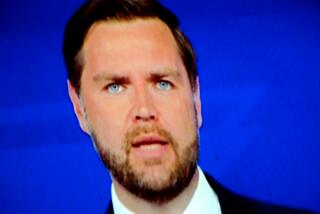PERSPECTIVE ON THE VICE PRESIDENCY : For Quality, Allow a Split Ticket : The presidential candidate would need a vote-getter in the No. 2 spot, not a pawn content to toil in subservience.
- Share via
What a difference a few days makes in one’s enjoyment of Dan Quayle jokes. Serious thought must now be given to the Quayle vice presidency, and to the vice presidency in general as a device for supplying spare parts for American political leadership.
Since Quayle was elected, so far as a distant observer can tell, the vice president has conscientiously and for the most part uneventfully fulfilled the duties of his office. He has made the required speeches to the party faithful, dutifully gone on trips, offered advice when asked and presided over the Senate when needed. The President has behaved toward him with kindness and consideration. Quayle appears to have recruited a first-rate staff. Yet the impression that he is unready to be President has not greatly diminished since he entered the public spotlight. Indeed, public opinion surveys suggest that fewer people believe he is up to presidential responsibilities today than ever before.
In part, this is the result of a bad press. Most politicians are at one time or another the butt of denigrating remarks. Vice presidents, occupying a position of little or no responsibility and high media exposure, are especially vulnerable to this treatment, as John Adams was the first to complain and as the famous but fictional career of Alexander Throttlebottom illustrates. Even so, Dan Quayle’s access to America’s funny bone puts him in a class by himself in modern times.
This is manifestly unfair. America frequently elects vice presidents who fall short of the presidential ideal. Vice President Quayle’s record of accomplishment in Congress, while slender, was considerably more constructive than that of the 38-year-old Sen. Richard Nixon whom Dwight Eisenhower invited aboard his bandwagon in 1952. Quayle has had no bouts of mysticism such as made Henry Wallace a risky successor to Franklin D. Roosevelt. And it is not recorded that he has used the vice president’s office to receive payoffs from grateful highway contractors, a la Spiro Agnew.
Our problem, it seems, is not merely Dan Quayle; it is the vice presidency itself.
Arthur Schlesinger, for one, has suggested doing away with the post altogether. This proposal gives full recognition to the neglect of standards that goes into the picking of vice presidential candidates, but it slights the fact that once in a while a presidential stand-in or successor is actually needed. A better idea would be to put some incentives into the system that might improve the general caliber of the breed. Like Schlesinger’s proposal, this would require a constitutional amendment.
The heart of the difficulty is that because a party’s candidates for President and vice president are bundled together and run as an indivisible team, the temptation to pick a vice presidential candidate in order to help a presidential candidate--or to minimize harm to him--is overwhelming.
Complementarity with the presidential candidate’s electoral appeal crowds out everything else. Too often overwhelmed in the process is the simple issue of quality. So, suppose vice presidents had to run and be elected on their own, as lieutenant governors of many states must now do. This might well create the incentives that the parties would need to supply better candidates.
The dangers of such a proposal are not trivial. If members of different parties were elected, or even if a separately elected vice president of the President’s party was too independent, the collaboration in office would suffer. The first casualty would be the vice president’s access to presidential business and to day-to-day preparation for a possible succession in emergency conditions.
Of course, election on the same ticket is no guarantee of good cooperative relations, as Hubert Humphrey, among others, discovered. So, while real risks exist, they offer only a modest contrast to contemporary conditions.
And so it is worth considering whether candidate George Bush would have been quite so ready to pick Dan Quayle if he knew Quayle would have to run independently against the likes of Lloyd Bentsen. The ever-present threat of an adverse reaction by voters could significantly upgrade the pool of those seriously considered for the vice presidency. The independence of the vice presidential electorate would intensify the need for the presidential candidate to be active in selecting the vice presidential nominee. Presidents would strive for compatibility, but the subservience now required of vice presidents would become a distinct electoral liability.
A strong presumption must always exist against tinkering with the Constitution. Yet there can be no doubt that any irregularity in a sitting President’s heartbeat also causes fibrillations in the living Constitution.
More to Read
Get the L.A. Times Politics newsletter
Deeply reported insights into legislation, politics and policy from Sacramento, Washington and beyond. In your inbox twice per week.
You may occasionally receive promotional content from the Los Angeles Times.










